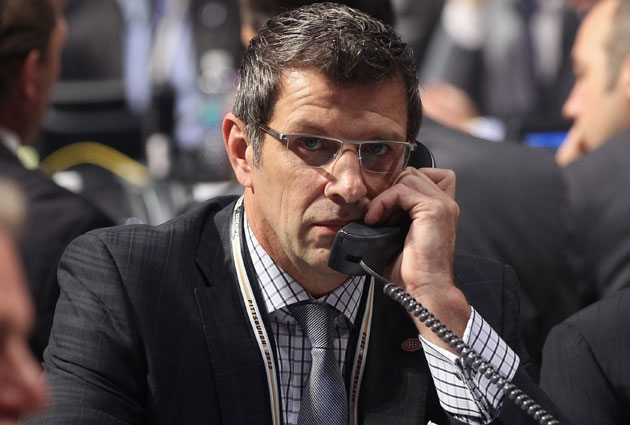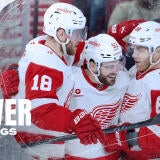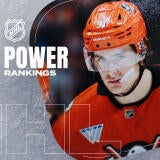
Canadiens GM Marc Bergevin making strides on ice and balance sheet
It's still early. That being said, for Montreal Canadiens fans, there is cause for optimism. Things seem to be headed in the right direction.

More NHL: Scores | Standings | Odds | Fight-O-Meter | League Leaders | Rumors
It's still early. That being said, for Montreal Canadiens fans, there is cause for optimism. Things seem to be headed in the right direction.
When the Canadiens hired Marc Bergevin as their general manager in May, the appointment was criticized on the basis that Bergevin didn't have any experience as an NHL GM, or much front-office experience for that matter. In 2008, he served as an assistant coach for the Chicago Blackhawks after three seasons with their scouting staff. In July 2009, he was appointed the team's director of player personnel. On June 15, 2011, Bergevin became the assistant general manager of the Blackhawks.
Perhaps acknowledging his lack of experience, Bergevin surrounded himself with pretty much most of the free world, hiring Rick Dudley, Scott Mellanby, Michel Therrien, Gerard Gallant, Clement Jodoin, J.J. Daigneault, Sylvain Lefebvre and Ethan Moreau.
To date, Bergevin has inspired confidence among the Canadiens' fanbase -- and much of it turns on his management of not only the team on the ice but also the balance sheet.
When the lockout ended, the Canadiens were facing serious challenges next season from a cap standpoint. With the cap dropping from $70.2 million to $64.3 million next season, the Canadiens only had $3.1 million to sign seven players. That's an average of $585,000 per player. And that's just a shade more than the $550,000 league minimum in 2013.
That's when Bergevin sprung into action. The club bought out Scott Gomez, clearing up $7.357 million in cap space next season. The way he did it was ambitious and not without risk (see my CBS article here on how the Canadiens avoided a grievance).
Ultimately, by sending Gomez home this season to preserve a buyout next season, the Canadiens opened themselves up to a grievance. There was a good legal argument that a healthy player could not be sent home simply to preserve a buyout. By doing so, Gomez was being denied the opportunity to showcase his talents with a view to securing a new contract next season. The problem for the Canadiens, though, was that an injured player could not be bought out. So the idea behind sending him home this season was to bubble wrap him for a buyout next season.
So it wasn't so much buying Gomez out that was impressive. That was going to happen. Rather, it was the way the Canadiens did it. The club made a risky but calculated move designed to force the NHL to change its newly negotiated rules so as to preserve a Gomez buyout next season. The Canadiens -- and their lawyers -- knew very well that the strategy could backfire and result in Gomez returning to the team this season. However, the team's ambitious strategy paid off, and the Gomez buyout was preserved.
And then we have the Erik Cole trade to Dallas for Michael Ryder. From an accounting perspective, this was another shrewd move by the Club. The 34-year-old Cole has a cap hit of $4.5 million over the next two seasons, while Ryder (32 years old) will be an unrestricted free agent next season. By making the trade, Bergevin freed up another $4.5 million for next season.
From a balance sheet standpoint, the Cole-for-Ryder trade makes very good sense. From an on-ice perspective, the value of the trade is less clear. Cole makes players around him better; Ryder needs good players around him to be better. Cole helps you win; Ryder helps you score. Cole is a strong, gritty player; Ryder is an average skater and is not terribly physical. Cole is a more valued teammate when games matter; Ryder has had his maturity questioned. Yes -- Cole's desire to play might have been questioned at times. However, that might have resolved itself over time.
Still, the key here is cap space, which, like a player or draft pick, is an asset. By trading Cole, the Canadiens acquired an asset in cap space that might be leveraged in future to improve the club. So, on balance, the trade made sense for the Canadiens, particularly if it no longer considered Cole part of its plans long-term.
There's more.
The Canadiens have one more amnesty buyout left (teams get such buyouts that don't count against the cap). The team could well buy out Thomas Kaberle, whose cap hit is $4.25 million.
So it looks like the Canadiens could go from having just $3.1 million in cap space next season to sign seven players to having about $17 million in cap space to sign seven players. That's a massive improvement that was achieved without compromising the quality of the team. If anything, the team might improve.
That's some good work.
For more hockey news, rumors and analysis, follow @EyeOnHockey on Twitter, subscribe to our YouTube account and like us on Facebook.
















